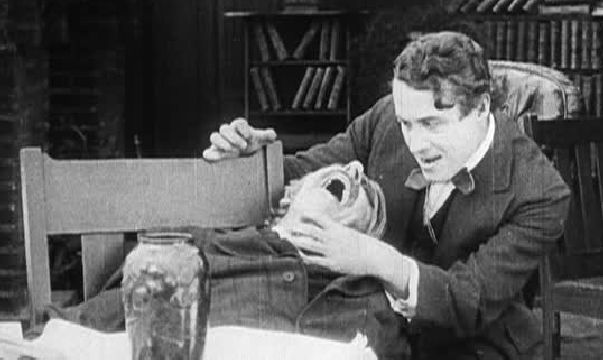The Avenging Conscience; or Thou shalt Not Kill (1914) 

The Avenging Conscience; or Thou shalt Not Kill (1914)
Director: D. W. Griffith
Cast: Henry B. Walthall, Spottiswoode Aitken, Blanche Sweet
Synopsis: Banned from dating his sweetheart by his uncle, a young man’s thoughts turn to murder.
Inspired by Edgar Allan Poe’s horror story The Tell-Tale Heart, and sampling some of the writer’s other works, D. W. Griffith makes a rare foray into the horror genre with The Avenging Conscience. The coda sometimes added to that title is Thou Shalt Not Kill, which gives an indication of the rather unsubtle religious subtext Griffith felt compelled to insert into the plot. It’s a subtext which Poe would never have countenanced, and which weakens an otherwise gripping drama.
Henry B. Walthall (Abraham Lincoln, The Cabin in the Cotton) gives a terrific performance as a young man whose close relationship with his doting uncle and guardian (Spottiswoode Aiken – The Birth of a Nation, Intolerance) is damaged when the older man objects to his protege’s developing romance with a young girl (Blanche Sweet – Judith of Bethulia, The Battle at Elderbush Gulch). The younger man’s respect for his uncle is strong enough for him to end the romance, but his love for the girl also has him harbouring thoughts of killing the old man so that he can have both the girl and his Uncle’s money. However, after finally working up the nerve to kill his uncle, the man is driven to madness not only by the fact that an itinerant Italian worker who witnessed the crime is blackmailing him, but by his own guilt which is manifested in visions of his murdered uncle whom he has walled up in the chimney.
Although there are some obvious limitations in The Avenging Conscience, which can mostly be attributed to its age, it’s also clear that Griffith had developed an almost instinctive sense of what worked on the screen. He would stage scenes in a way that would never occur to other directors at the time. For example, it would have been common for the fact that the murder is being witnessed by having a face peering through a window while the crime is committed, but instead Griffith cuts away to a close up of the Italian, focusing on his reaction (which is admirably restrained) rather than the act itself. It’s this kind of thing that marked Griffith out as the master filmmaker of his generation, and it’s just a shame that his inability to shake off his Victorian values and prejudices marred the later stages of his career. The heavy-handed religious symbolism is another example of the Victorian hang-ups that dogged Griffith. Instead of feeling guilt over the taking of another man’s life, the young man’s torment seems to derive from his breaking of one of the commandments, as indicated in the title.
There’s a hoary old twist near the movie’s end which most people will see coming a mile off, and a completely bonkers epilogue in which some fauns – who look remarkably like human teletubbies – answer the call of Pan’s pipes, but overall The Avenging Conscience is one of Griffith’s better – and curiously overlooked – movies from this period.
(Reviewed 21st April 2015)
httpv://www.youtube.com/watch?v=peQj1s2CTSo

